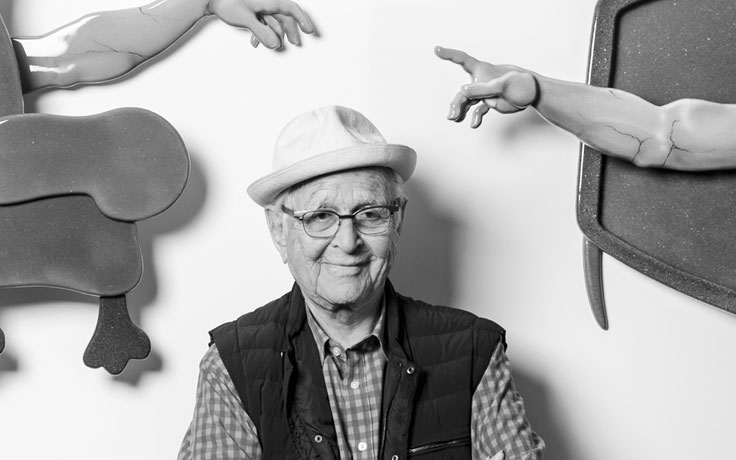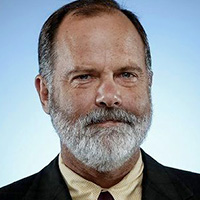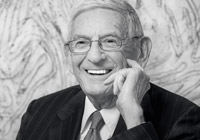NORMAN LEAR’S OFFICES ARE A GATEWAY to American values. There are cast photos — “Maude,” “The Jeffersons,” “Good Times,” “All in the Family” and more — programs that redefined American culture on television and were formative to so many families. And then there is the Declaration of Independence, of which Lear owns an original copy. A less treasured version hangs in his lobby beside an American flag, reminding visitors that his work grows from deeply felt patriotism, a love of country that is as profound as it is inclusive.
Lear is best known, of course, for his incomparable contributions to TV and, through it, to American life. His work in shaping culture, however, does not stop there. He is a prolific and diverse philanthropist. He has backed a years-long campaign to register young voters and sponsored a trust and awards to recognize and encourage businesses to think beyond the short term. He was early to see the threat of climate change and has given to organizations devoted to addressing it. And, most significantly, in 1981, he founded People for the American Way, an enduringly influential nonprofit and one of the nation’s most respected liberal political organizations.
He is also the author of a charming and illuminating memoir, “Even This I Get to Experience,” published in 2015 by Penguin Books.
Lear and Blueprint editor-in-chief Jim Newton spoke this fall in Lear’s Beverly Hills office, their latest installment in a conversation that began years ago over their mutual admiration for President Dwight Eisenhower. On this day, Lear was fresh from closing production on a television series, the second season of “One Day at a Time,” a recap of the original but with a Latino cast. He had also just sold a new idea to NBC. Lear is 95 years old.
Blueprint: You founded People for the American Way. What is the American Way?
Norman Lear: That’s a great question.
Every once in a while, for over 35 years, new members of the board or somebody comes in and asks: “What do you stand for? What are you against?” I love that conversation.
The problem is simplicity. … What is the Christian Way? It’s the Sermon on the Mount, if you want to say it in a few words. The American Way? It’s the Bill of Rights. It’s the Declaration of Independence and the Preamble to the Declaration. It’s the guarantee that in this country, every man, woman and child who’s an American will see equal justice under the law and experience equal opportunity under the law. It’s as … simple as that.
Delivering that is where the hard work comes in. But that’s where you start. I mention the Christian Way because both of them [the American Way and the Christian Way], at essence, are doing for others, caring for one’s brother or brothers, the family of man. The two Ways are first cousins.
BP: Do you think, on a philosophical level, that many people disagree with that? I mean, where does the rub come? Our politics are divided, and yet it’s impossible to imagine having a serious conversation with anyone who doesn’t believe in equal justice or equal opportunity.
NL: At the base of those people I respect who are Republicans or who are right of center, because a lot of people are not necessarily Republicans but feel themselves right of center, I think it’s easy to believe and understandable to think that through the centuries there have always been people at the bottom. That has never, ever changed. Through the centuries, people have been much more taken advantage of than they are today.
But the fact that there will always be the lower, lower, lower class economically and therefore — in terms of education and reasonable opportunity — they’ve existed forever and will always exist, doesn’t mean, “There’s nothing I can do about it.”
If I were having this debate right now, what would be my position? “You’re right, sir. Through the centuries, this has been the case.”
But would Jesus throw up his hands and say: “There’s nothing we can do about it”? I don’t think so. I think he would be doing whatever he could, however little it turned out to be. My sense is that’s what is expected of us.
BP: Guided by that, what caused you to found People for the American Way?
NL: It was 1980. I had been aware for a little while of the proliferation of evangelicals on television.
I was amused by them at first. I thought about doing, still think about doing, a film called “Religion,” about them. But as I watched Falwell, Robertson, etc., that was anathema to me, as a kid who took civics in public school. There is no teaching of civics now. There’s no reason for young people today to grow up understanding and therefore loving what we’re supposed to be about, the promises we made to ourselves in our founding papers. We don’t have civics classes. We don’t pay enough attention to that.
I didn’t wake up any morning of my life and think: “I will start an organization.” What I thought to do about the proliferation of those ministers was to make a TV spot. It [featured] a working stiff with a piece of factory equipment looking into a camera and saying he has a problem. He and his wife and kids talk about politics around the dinner table. They disagree about lots of things. Ministers on radio and television are now telling him that he’s the best of the Christians in the house because he’s on the right, and he agrees with them. But he knows his wife is a better Christian. … So he winds up saying: “There’s got to be something wrong when anybody tells you you’re a good or a bad Christian depending on your political point of view. That’s not the American Way.”
I took it to Father Hesburgh at Notre Dame, because I knew him. He said, “Norman, I agree with this. I think you’ll find mainline church leaders will agree with you, but they’ll also be happy to see this for another reason.”
I said: “What’s that, sir?”
He said: “Because of the way they, meaning the evangelicals, torture a scripture.” I never forgot that — “the way they torture a scripture.”
And he gave me the names of half a dozen mainline church leaders. One of them was the head of the Lutheran office in D.C., and somebody in that office said, “You know, the spot is good. … You ought to organize around this. I love what this guy at the end says: ‘It’s not the American Way.’ Why don’t you be ‘People for the American Way’?”
So that’s how that happened.
The American Way. The American Way is very fucking clear, if one pays a lot of attention to the Bill of Rights, the American Constitution, equal justice, equal opportunity. That’s the American Way.
BP: When you founded People for the American Way, Ronald Reagan was president. Now you have Donald Trump. How do you feel about the country today compared to the country you founded People for the American Way to help?
NL: Sometimes I fall from having been in love with America down to just loving my country. We all love our country for very good reason. But being in love with our country requires caring about its core, its essence, its promise. I have to be in a conversation like this to remember to get back in love.
We’ve taken ourselves too seriously. We’ve chosen to believe we’re God’s chosen. Nobody is.
I remember after World War II. I served in World War II. Afterward, I thought: “My God, who could believe that we could win the way we did, beat the … the Axis in both the West and East, and then come up with the Marshall Plan and help Europe back on its feet?”
We were really good guys. But I think we began to believe our press.
BP: Do you think you’ve had more of an influence over America through your philanthropy or your television?
NL: How could I answer that? When people talk to me about what I’ve done, they talk to me about the shows and the messages they think those shows carry, what they took from them. What I love to hear more than anything — and I hear it all the time — is: “We used to watch it as a family, and we talked afterward.”
That’s everything to me. “We talked about it.” It opened up discussion. That’s the best thing it did.
BP: And yet I note from your memoir that Jerry Falwell once called you “the greatest threat to the family in our generation.” Congratulations for that, by the way.
NL: That cost me about two weeks of protection. … I got death threats as a result of that letter. When they found the kid who sent me these death threats, they found him in San Diego, living with his folks. His door was padlocked. When they got into that room, they found that the Falwell page was on the wall with a black circle around that passage and a black circle around the whole page….
BP: One of the complaints that you hear often about Hollywood and politics is that it’s sort of predictably left, and these people are out of touch, well-to-do people. What’s your response to that?
NL: My response is that these people are artists, [and] people interested in the arts anywhere in the world, I would bet, lean to the left.
BP: Why?
NL: Because these are people — whether they are painters or poets or playwrights or novelists — who are interested in the human condition. And you can’t think about the human condition without realizing that with a tilt to the left people will be better off.
BP: Do you think Hollywood has too much influence in American politics?
NL: I don’t think it has much influence. Unless you call “The Apprentice” Hollywood.
Trump is not Hollywood.
BP: Of course. He’s really New York real estate, casino. I know the answer to this, but I have to ask: What do you think of Trump?
NL: I thought from the beginning, and I still think, that Donald Trump represents the middle finger of the American right hand. That’s the American people looking at leadership and feeling — not thinking this through. In their emotionally crowded lives, I don’t think they’ve come to a theory. When people think, “Fuck you,” that doesn’t come from theorizing. It’s the middle finger.
BP: Do you worry for the recovery of the country after Trump? Is there a recovery?
NL: I don’t want to wake up in the morning without hope, so of course there is a recovery from Trump.
BP: Who in American politics do you admire?
NL: Not many. Elizabeth Warren.
I’m disappointed that I haven’t heard enough from her. I don’t mean me personally. In the last six months to a year, she hasn’t been the bellowing woman she was before. And I loved her bellowing.
BP: Anyone here in California?
NL: There’s nobody who arrests my attention.
BP: There’s a little Archie Bunker in Donald Trump. Does that freak you out?
NL: The reason that Archie Bunker was successful is that there’s a little of him in a lot of us.
BP: I’ve read about your Business Enterprise Trust. What was behind that?
NL: What drives the American corporation — and the American corporation, as I keep quoting Eisenhower, has the country in its clutches —
is the need for a profit statement this quarter larger than the last. Now, there is nothing in nature that I know that suggests that anything can grow forever. Anything. And yet, the corporate ethic is a profit statement necessarily larger this quarter than the last, which has to be at the expense of every other value. …
And so, we formed the Business Enterprise Awards and Trust. At 7:30 in the morning, on a Monday or a Tuesday, for six years, in the Rainbow Room, we had our annual event. It was a breakfast instead of a dinner. Every Larry Tisch — 240 to 250 heads of American corporations — was there.
I did a five- to six-minute documentary on each of the awardees. … Those films, by the way, every once in a while I get a check for $1.26 from the Harvard University Business School Publishing Company … because those films are still being run in business school.
BP: In case you ever need it to break even …
NL: It was a stunning group. I couldn’t have been prouder.
BP: How do you appraise the role of corporations in American life today?
NL: I think corporate values have taught us to think in the short term. When every statement has to be greater than the last, that is short-term thinking. And “What’s in it for me?” and “How do I become No. 1?” All that has rubbed off on the American people. Kids grow up to go to business school now.
BP: This is off the subject, but I can’t resist asking: In your memoir, you say that the character that best expresses you is Maude. What do you mean by that?
NL: Well, I adored Bea Arthur. We were friends long before “Maude”….
My early family life as a kid suggested that the people with the biggest grudges were the ones who carried them over the longest number of years. So when my family had a get-together at Christmas or on the 4th of July or whatever, and people came in from Boston or New Haven and so forth, the biggest arguments were about: “When you got married 22 years ago, you didn’t invite Helen to the event.” Those giant fights. …
I wanted someone to beat the shit out of Archie. And out of the family experience, I thought Edith has a friend — in this case a first cousin. They adored each other, but the cousin always hated Archie. She didn’t want Edith to marry him, fought against the marriage. She had all that history. And that’s Bea Arthur. And she slugged him from down below. It was great.
That [Archie Bunker] show was running out here when Fred Silverman called and said, “There’s a show in that woman.” Believe me, we’d already been thinking about it. And we did “Maude.”
I’ve said Maude resembles me. There’s a big difference between Rob Reiner and Norman Lear, politically. Rob Reiner knows every [single] thing he’s talking about. I don’t know how he does it. He’s a scholar. He knows what he’s saying. Norman Lear spouts, but if he’s going to back it up, he’s going to have to go to books or call Rob.
Archie was that kind of a conservative, and Bea Arthur was a horseshit liberal. I’m a horseshit liberal.
BP: As long as you have Rob Reiner’s number handy …
NL: Actually, I think of myself as a bleeding-heart conservative.
BP: What does that mean?
NL: Everything we’ve been talking about. You will not fuck with my Bill of Rights, my First Amendment, my Constitution. I will die for any part of that.
But does my heart bleed for those people who Republicans will pass over on Obamacare, for example, or who, through no fault of their own, have not had the opportunity or the education that others have had? Yes.
























